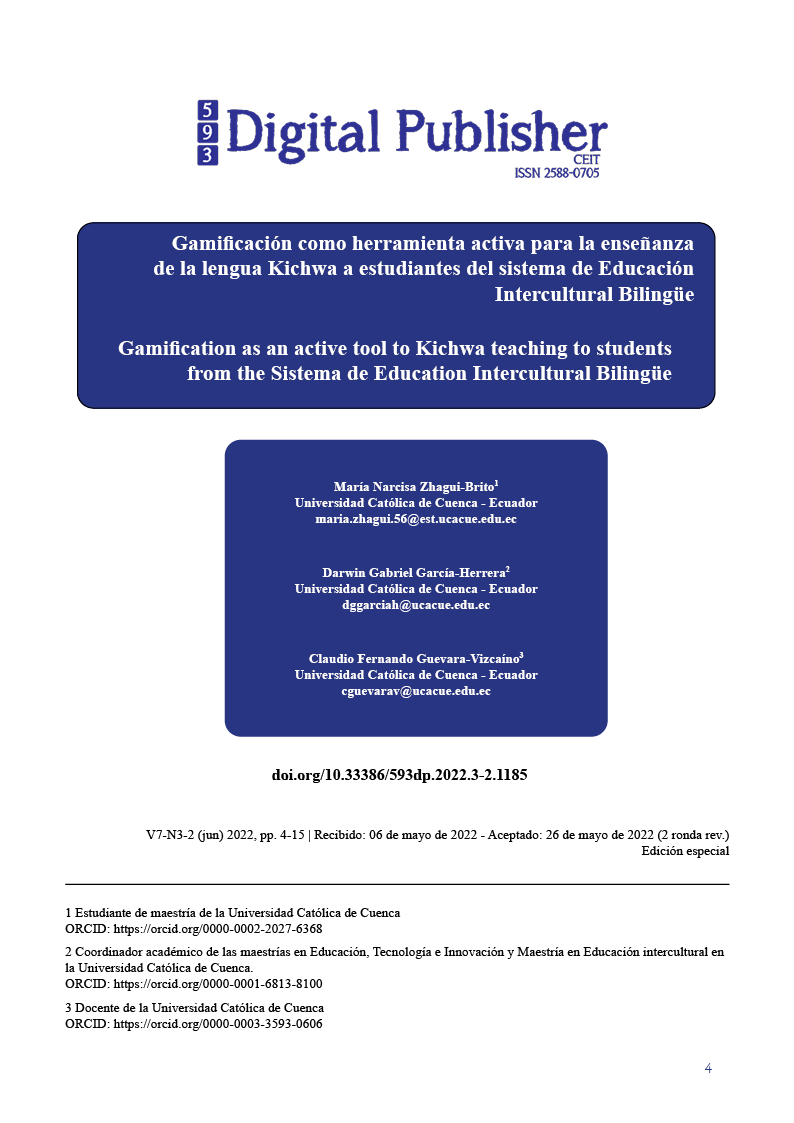Gamification as an active tool to Kichwa teaching to students from the Sistema de Education Intercultural Bilingüe
Main Article Content
Abstract
Active teaching-learning methodologies are new tools for teachers to interact with students from a different and innovative perspective. This article analyzes the incidence of gamification during a Kichwa language class. Knowing that language learning is not fully accepted as it is considered of little value. To this we must add the little diversification of innovative teaching methodologies. A percentage of teachers still use traditional and unmotivating methods that hardly contribute to achieving significant student learning. This research was carried out through an observation sheet to students of the Leonidas Proaño II school in the Community of Monjas in Quinjeo. Quantitative data were obtained and analyzed using the SPSS program. Finally, it was possible to verify that online games, that is, gamification, had a positive impact during class, stimulating students to remember what they had learned to apply it in the activity. Therefore, the teacher was able to know the topics to reinforce.
Downloads
Article Details

This work is licensed under a Creative Commons Attribution-NonCommercial-ShareAlike 4.0 International License.
1. Derechos de autor
Las obras que se publican en 593 Digital Publisher CEIT están sujetas a los siguientes términos:
1.1. 593 Digital Publisher CEIT, conserva los derechos patrimoniales (copyright) de las obras publicadas, favorece y permite la reutilización de las mismas bajo la licencia Licencia Creative Commons 4.0 de Reconocimiento-NoComercial-CompartirIgual 4.0, por lo cual se pueden copiar, usar, difundir, transmitir y exponer públicamente, siempre que:
1.1.a. Se cite la autoría y fuente original de su publicación (revista, editorial, URL).
1.1.b. No se usen para fines comerciales u onerosos.
1.1.c. Se mencione la existencia y especificaciones de esta licencia de uso.
References
Aguirre, G. V. (2019). Educación Intercultural Bilingüe en Ecuador : Una revisión conceptual Educación Intercultural Bilingüe en.
Buitrón Cachipuendo, B., Díaz Gispert, L. I., & Cahuasquí Anrango, J. A. (2020). Diseño de un aplicativo web para la enseñanza del idioma kichwa [Design of a web application for teaching the Kichwa language Design de um aplicativo da Web para o ensino da língua Kichwa]. RIDE Revista Iberoamericana Para La Investigación y El Desarrollo Educativo, 11(21). https://doi.org/10.23913/ride.v11i21.781
Cahyani, A. D. (2016). Enfoque de gamificación para mejorar la participación de los estudiantes en el curso de idiomas [Gamification approach to enhance students engagement in studying language course]. MATEC Web of Conferences, 58. https://doi.org/10.1051/matecconf/20165803006
Contreras Espinosa, R. S. (2016). Presentación. Juegos digitales y gamificación aplicados en el ámbito de la educación [Digital games and gamification applied to education]. RIED. Revista Iberoamericana de Educación a Distancia, 19(2), 27. https://doi.org/10.5944/ried.19.2.16143
Encarnación, P.-G., Moreno-Fernández, O., & Moreno-Crespo, P. (2018). Educación para la diversidad cultural y la interculturalidad en el contexto escolar español [Education for the cultural diversity and the interculturality in the Spanish school context]. Revista de Ciencias Sociales, 23(2), 11–26. https://doi.org/10.31876/rcs.v23i2.24949
González-Alonso, F. (2019). La Educación Intercultural En Un Taller De Gamificación. In Migración, Interculturalidad y Educación: Impactos y desaf{’i}os (Issue January).
Henríquez, S., Javier, F., Márquez, Y., Natalie, J., Quintana, B., Graciela, M., Javier, F., Henríquez, S., Natalie, J., & Márquez, Y. (2020). ACT-ED : instrumento unifactorial para medir la actitud hacia el uso educativo de TIC en docentes chilenos de educación secundaria. https://doi.org/10.21703/rexe.20201941sandoval12
Mallitasig Sangucho, A. J., & Freire Aillón, T. M. (2020). Gamificación como técnica didáctica en el aprendizaje de las Ciencias Naturales [Gamification as a teaching technique in the learning of Natural Sciences]. INNOVA Research Journal, 5(3), 164–181. https://doi.org/10.33890/innova.v5.n3.2020.1391
Martínez-Navarro, G. (2017). Tecnologías y nuevas tendencias en educación: Aprender jugando. El caso de Kahoot [Technologies and new trends in education: Learning by playing. Kahoot’s case]. Opción, 33(83), 252–277. https://n9.cl/etf1
Ministerio de Educacion. (2018). MOSEIB (Tercera). https://n9.cl/4hd3ln
Ministerio de Educacion. (2021). Currículo priorizado con énfasis en competencias comunicacionales, matemáticas, digitales y socioemocionales (p. 66). https://n9.cl/t9vek
Neira-Gonzáles, M., & Pulgarin Moran, E. (2021). La Innovación Educativa como herramienta pedagógica en el proceso de enseñanza-aprendizaje en tiempos de pandemia de la Unidad Educativa Fiscal José Jesús Ocampo Salazar [Teaching-Learning Process in Pandemic Times of the teaching-learning process in pand. 1, 96–120. https://n9.cl/bhcru
Ocaña Chiluisa, J. (2017). Las TICS en la educación intercultural [ICTs in intercultural education]. Revista Publicando, 4(11(1)), 369–379. https://n9.cl/qcato
Orrego-Riofrío, M., & Aimacaña-Pinduisaca, C. J. (2018). Herramienta multimedia educaplay como recurso didáctico en el proceso enseñanza- aprendizaje de química y física general [Educaplay multimedia tool as a teaching resource in the teaching process - chemistry and general physics learning]. Polo Del Conocimiento, 3(10), 44. https://doi.org/10.23857/pc.v3i10.729
Paronyan, H., & Domingo, S. (2018). Educación intercultural bilingüe en Ecuador: retos principales para su perfeccionamiento y sostenibilidad [Intercultural bilingual education in Ecuador: challenges, development and sustainability]. Transformación, 14(3), 310–326. https://n9.cl/7k698
Pascuas Rengifo, Y., Vargas Jara, E., & Muñoz Zapata, J. (2017). Experiencias motivacionales gamificadas: una revisión sistemática de literatura [Motivational experiences of gamifications: a systematic literature review]. Innovación Educativa (México, DF), 17(75), 63–80. https://n9.cl/idz2k
Peralta-Lara , D., & Guamán-Gómez, V. (2020). Metodologías activas para la enseñanza y aprendizaje de los estudios sociales [Active methodologies for the teaching and learning of social studies]. SOCIEDAD Y TECNOLOGÍA, 3, 1–10. https://n9.cl/8hgg5
Pérez de A, M. del C., & Telleria, M. B. (2012). Las TIC en la educación: nuevos ambientes de aprendizaje para la interacción educativa [TICS in education: new learning environments for educational interaction]. Revista de Teoría y Didáctica de Las Ciencias Sociales, 18, 83–112. https://n9.cl/plfl1
Rabah, J., Cassidy, R., & Beauchemin, R. (2018). Gamificación en Educación – ¿Beneficios Reales o Entrenimientoto Educativo?[Gamification in education: Real benefits or edutainment?]. Proceedings of the European Conference on E-Learning, ECEL, 2018-Novem(May), 489–496. https://doi.org/10.13140/RG.2.2.28673.56162
Rojas-Viteri, J., Álvarez-Zurita, A., & Bracero-Huertas, D. (2021). Uso de Kahoot como elemento motivador en el proceso enseñanza-aprendizaje [Use of Kahoot as a motivating element in the teachinglearning process]. Cátedra, 4(1), 98–114. https://doi.org/10.29166/catedra.v4i1.2815
Romero Bojórquez, L., Utrilla Quiroz, A., & Utrilla Quiroz, V. M. (2014). Las actitudes positivas y negativas de los estudiantes en el aprendizaje de las matemáticas, su impacto en la reprobación y la eficiencia terminal [Positive attitudes and negative of the students in the learning of mathematics, its impact on the reproach . Ra Ximhai, 291–320. https://doi.org/10.35197/rx.10.03.e1.2014.20.lr
Sandoval, C. H. (2020). La Educación en Tiempo del Covid-19 Herramientas TIC : El Nuevo Rol Docente en el Fortalecimiento del Proceso Enseñanza Aprendizaje de las Prácticas Educativa Innovadoras Covid-19 Education in Time ICT Tools : The New Teaching Role in Strengthening the Te. Revista Internacional Tecnológica - Eucativa Docentes 2.0, 9, 24–31. https://n9.cl/tpwi5
Trejo- González, H. (2019). Recursos tecnológicos para la integración de la gamificación en el aula [Technological resources for the integration of gamification in the classroom]. Tecnología, Ciencia y Educación, 13(2019), 75–117. https://n9.cl/jrty6
Zambrano-Álava, A. P., Lucas-Zambrano, A. T., Lucas-Zambrano, M.-D.-L.-Á., & Luque-Alcívar, K. E. (2020). Gamificación y aprendizaje autorregulado [Gamification and self-regulated learning]. Episteme Koinonia, 3(5), 287. https://doi.org/10.35381/e.k.v3i5.847
Zepeda-Hernández, S., Abascal-Mena, R., & López-Ornelas, E. (2016). Integración de gamificación y aprendizaje activo en el aula. [Integration of gamification and active learning in the classroom]. Ra Ximhai, 12(6), 315–326. https://n9.cl/6ni83
Zurita Cruz, C. E., Zaldívar Colado, A., Sifuentes Ocegueda, A. T., & Valle Escobedo, R. M. (2020). Análisis crítico de ambientes virtuales de aprendizaje [Critical analysis of virtual learning environments]. Utopia y Praxis Latinoamericana, 25(Extra11), 33–47. https://doi.org/10.5281/zenodo.4278319




